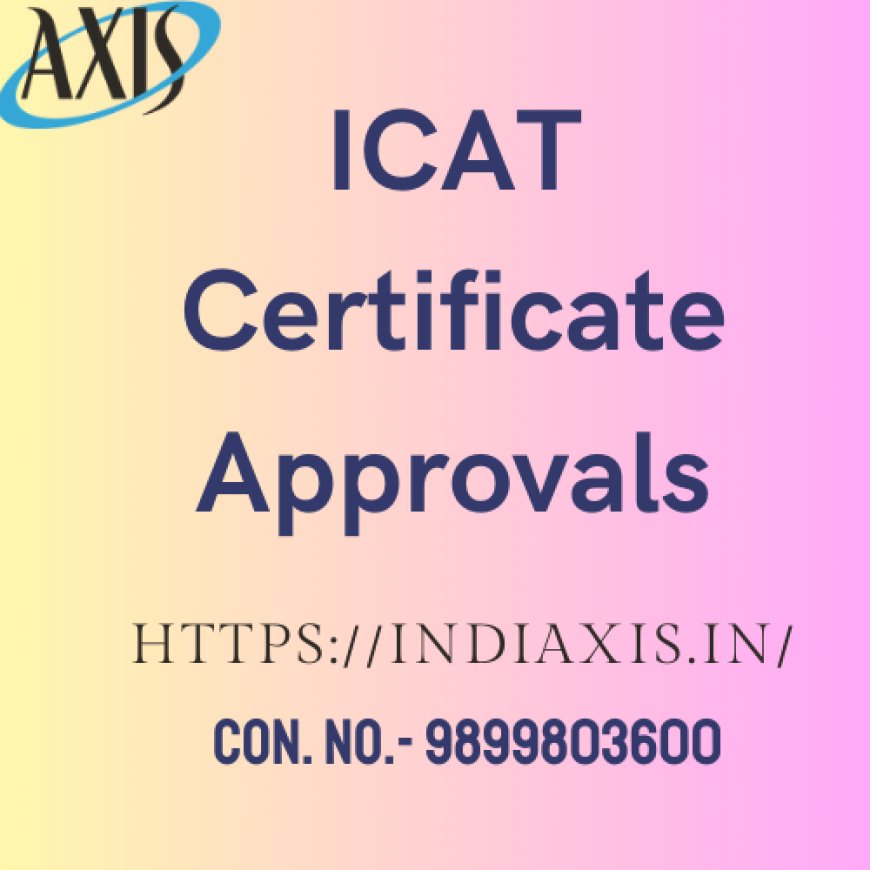ICAT Certificate Approvals
Get your ICAT certificate approvals quickly and hassle-free. Expert guidance on automotive certification, compliance, and testing for a smooth approval process.

The International Centre for Automotive Technology (ICAT) is one of India's leading testing, validation, and certification agencies for the automotive sector. As a premier institute under the Ministry of Heavy Industries, Government of India, ICAT plays a pivotal role in ensuring that vehicles and their components comply with national and international standards. ICAT certification approvals are essential for manufacturers looking to sell their products in India and abroad, as they signify compliance with stringent safety, environmental, and performance regulations.
Importance of ICAT Certification
ICAT certification approvals are crucial for automotive manufacturers, component suppliers, and other stakeholders in the industry. The certification process ensures that vehicles, auto parts, and related systems meet regulatory requirements before being introduced into the market. These approvals help in:
-
Ensuring Safety: Vehicle safety is a primary concern, and ICAT certification ensures that automotive components and vehicles meet prescribed safety standards to prevent accidents and minimize risks to passengers and pedestrians.
-
Regulatory Compliance: ICAT certification is mandatory for various categories of vehicles, including two-wheelers, three-wheelers, passenger cars, commercial vehicles, and electric vehicles. It ensures compliance with the Automotive Industry Standards (AIS), Central Motor Vehicle Rules (CMVR), and other applicable regulations.
-
Market Access: Many global and domestic markets require ICAT certification for product approvals. Without the necessary certifications, manufacturers may face restrictions on selling their products in the market.
-
Environmental Standards Compliance: With increasing emphasis on sustainable practices and environmental conservation, ICAT certification ensures that vehicles adhere to Bharat Stage (BS) emission norms and other environmental guidelines.
-
Quality Assurance: Certification approvals from ICAT reinforce consumer confidence in the quality and reliability of automotive products.
Types of ICAT Certification Approvals
ICAT provides a wide range of certification approvals, catering to different segments of the automotive industry. The key certifications offered by ICAT include:
1. Whole Vehicle Type Approval (WVTA)
-
This certification is required for manufacturers to sell new vehicle models in India.
-
It covers all vehicle types, including passenger cars, commercial vehicles, electric vehicles (EVs), and hybrid vehicles.
-
Ensures compliance with CMVR 1989 and other applicable regulations.
2. Component and System Certification
-
Automotive parts and components such as brakes, lighting systems, tires, and batteries require ICAT approval.
-
Ensures adherence to safety and performance standards as per AIS and BIS (Bureau of Indian Standards).
3. Homologation Services
-
Homologation is the process of approving vehicles and components for use on Indian roads.
-
ICAT conducts tests to ensure compliance with CMVR and AIS standards before granting approvals.
4. Electric Vehicle (EV) Certification
-
With the growing adoption of electric mobility, ICAT provides certification services for electric vehicles, batteries, chargers, and EV components.
-
Ensures compliance with FAME India (Faster Adoption and Manufacturing of Electric Vehicles) scheme guidelines.
5. Emission Certification
-
ICAT conducts tests to verify compliance with Bharat Stage (BS-VI) emission norms.
-
Certification ensures that vehicles meet environmental standards for reduced emissions.
6. Crash Testing and Safety Approvals
-
Ensures that vehicles comply with frontal and side-impact safety standards.
-
Conducts crash tests to evaluate structural integrity and occupant protection features.
7. Automotive Lighting and Signaling Device Approval
-
Certification for headlamps, tail lamps, indicators, and other vehicle lighting systems.
-
Ensures compliance with AIS-012 and related standards.
The ICAT Certification Process
The ICAT certification process involves several steps to ensure that the vehicle or component complies with national and international standards. The typical approval process includes:
-
Application Submission:
-
The manufacturer submits a formal application along with necessary technical specifications and supporting documents.
-
-
Preliminary Evaluation:
-
ICAT conducts an initial assessment of the submitted documents to verify completeness and conformity with regulatory requirements.
-
-
Testing and Evaluation:
-
The product undergoes extensive testing at ICAT's advanced testing facilities.
-
Tests include emission testing, safety evaluation, endurance testing, and performance analysis.
-
-
Report Generation:
-
A detailed test report is prepared, summarizing the results and compliance status of the product.
-
-
Certification Issuance:
-
Upon successful completion of all tests and verification, ICAT grants the necessary certification approvals.
-
-
Periodic Audits and Compliance Monitoring:
-
Even after certification, ICAT conducts periodic audits to ensure continued compliance with prescribed standards.
-
Benefits of ICAT Certification Approvals
ICAT certification approvals offer several advantages to manufacturers, consumers, and regulatory authorities, including:
-
Enhanced Credibility: ICAT certification signifies compliance with high-quality and safety standards, boosting brand reputation.
-
Regulatory Acceptance: Products with ICAT certification are readily accepted in both domestic and international markets.
-
Consumer Confidence: Certified vehicles and components provide assurance of safety, reliability, and performance.
-
Facilitation of Exports: Many global markets recognize ICAT approvals, helping manufacturers expand their business internationally.
-
Legal Compliance: Ensures adherence to government regulations, avoiding legal liabilities and penalties.
Conclusion
ICAT certification approvals are indispensable for the automotive industry, ensuring that vehicles and components meet safety, environmental, and performance standards. By obtaining ICAT certification, manufacturers can enhance their market reach, comply with legal regulations, and contribute to a safer and more sustainable automotive ecosystem.
What's Your Reaction?

























